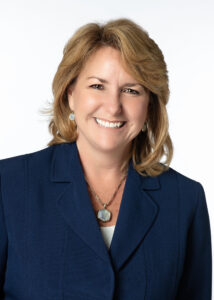Whole Health Focus: Training tomorrow’s nurses
- September 26, 2023
- By: Libby Maness
- Our People
 At its very core, nursing embodies the principles of Whole Health, emphasizing the intricate connection between mind, body and spirit, where individuals are treated as more than their symptoms.
At its very core, nursing embodies the principles of Whole Health, emphasizing the intricate connection between mind, body and spirit, where individuals are treated as more than their symptoms.
Dr. Cindy Weston, founding dean of The University of North Texas Health Science Center at Fort Worth’s College of Nursing, knows firsthand just how often whole health principles are used when practicing nursing. She’s applying that knowledge as she lays the groundwork for the nursing school’s curriculum.
“I always say, ‘Nurses were focusing on social determinants of health in patients before it was vogue,’” Weston said. “We’ve always looked at the dynamics of home life, social life and other external factors when treating patients.”
In recent times, a shift in the mindsets of providers has elevated Whole Health to the forefront of global and national health care. This sea change has created a need for more nurses who are trained with a Whole Health focus. For Weston and her leadership team, the mission of their curriculum is clear: to equip nurses with the ability to delve into every facet of their patients’ lives — be it mental, physical, emotional, financial, environmental or spiritual — and truly understand the significance of their existence.
In shaping this program, Weston is exploring HSC’s strengths, as well as the gaps in local and regional care, to find ways to creatively prepare her students. Her goal is not to replicate existing nursing curricula but to forge a contemporary curriculum that responds to today’s demands through the lens of Whole Health. By integrating the pillars of Whole Health into nursing education, these students will be equipped with a more comprehensive understanding of health, allowing them to provide more effective and patient-centered care.
Another focus Weston has for her curriculum is to foster her student’s ability to work on interprofessional teams. Having the ability to work with various health care professionals is an essential skill to help deliver the best possible care. When nursing students are educated within a curriculum that mirrors the experiences they’ll have beyond the classroom, they are more likely to collaborate seamlessly with other health care providers, including physicians, therapists and social workers.
“We are presented with an opportunity to infuse the principles of Whole Health and an interprofessional approach into every aspect of our curriculum,” Weston said. “We are nurturing a generation of nurses who embrace a professional identity centered on engaging in interprofessional teams to enhance the Whole Health of individuals, populations and communities.”






Social media